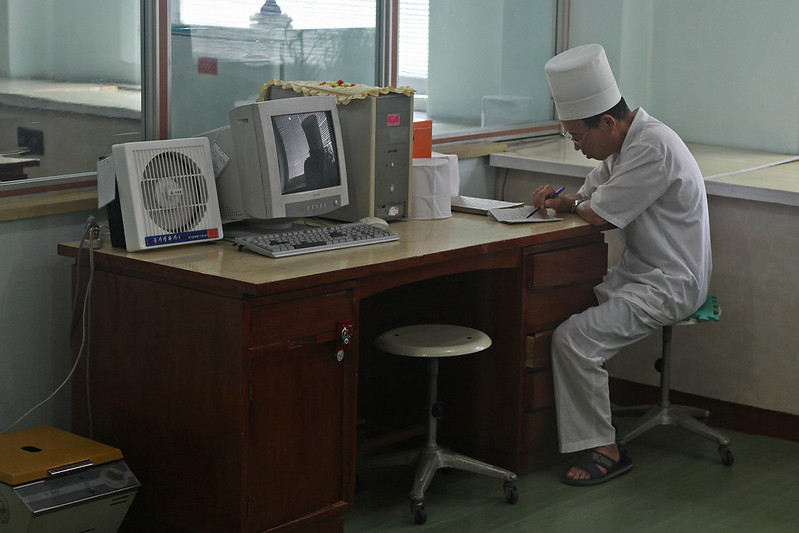8 Facts About Tuberculosis in North Korea
 Tuberculosis (TB) is a bacterial infection that mainly attacks the lungs, and can prove fatal without treatment. Tuberculosis spreads through the air via coughing or talking. It causes people to become sick because the immune system cannot prevent the bacteria from growing. The lengthy and specific nature of the treatment for TB means developing nations can struggle with treating tuberculosis epidemics. One of these nations is the Democratic People’s Republic of Korea (DPRK), which labels TB as one of its most serious health problems. Here are eight facts about tuberculosis in North Korea.
Tuberculosis (TB) is a bacterial infection that mainly attacks the lungs, and can prove fatal without treatment. Tuberculosis spreads through the air via coughing or talking. It causes people to become sick because the immune system cannot prevent the bacteria from growing. The lengthy and specific nature of the treatment for TB means developing nations can struggle with treating tuberculosis epidemics. One of these nations is the Democratic People’s Republic of Korea (DPRK), which labels TB as one of its most serious health problems. Here are eight facts about tuberculosis in North Korea.
8 Facts About Tuberculosis in North Korea
- Though the data on tuberculosis in North Korea is sparse, the rate of instances is estimated to be 442 out of 100,000 people. Furthermore, the WHO estimates that in 2017, the estimated mortality of TB per 100,000 people was 63%. While it had been slowly decreasing since the year 2000 (161%), estimated mortality has risen since 2015 (42%).
- North Korea is a poor country, which limits access to healthcare. According to a report by Amnesty International, the healthcare system has been collapsing, with barely-functioning hospitals devoid of medicine. Though the country claims to provide healthcare for all, estimates indicate it is spending under $1 per capita, less than any other nation in the world. Because it is unlikely that the regime will increase healthcare funding, TB patients often do not receive appropriate care.
- The inadequately funded healthcare system also means doctors are improperly trained. This results in maladaptive treatment strategies which are expensive and are prone to hijacking by the black market. Hence, many people turn to self-medicating and are unable to access crucial TB drugs. There have been efforts to train doctors through a program in the late 1990s. However, there have not been any in recent years, either from the government or from NGOs.
- The lack of documentation and data on tuberculosis in North Korea also causes more serious strains of TB such as multidrug-resistant (MDR)-TB to spread unchecked. Experts estimate that MDR-TB is an already growing problem. Disinformation surrounding TB in North Korea is so widespread. Many people regard TB as so common as to not require a trip to the doctors. Hence, education about the disease is critical. While there have been efforts to educate people about TB, only NGOs (rather than government-sponsored programs), like the Eugene Bell Foundation, have started initiatives to educate patients, though not the general public.
- North Korea’s poor track record on human rights also exacerbates its TB and MDR-TB crisis. According to the Health and Human Rights Journal, North Korea’s prison camps and migration across the China-Korea border heighten the risk of citizens contracting TB. Additionally, those migrating or detained are more likely than the average North Korean to receive little or no treatment.
- North Korea’s standing as an international pariah aggravates its struggle with tuberculosis. The regime’s totalitarian nature, cold war-era cult of personality, nuclear ambitions and disregard for human rights causes it to face sanctions, political antagonisms and limited medical exchange. International sanctions ban the export of minerals, agricultural products, technology, aviation fuel, metals and more. This results in limited resources, making testing and treatment nearly impossible.
- In 1998, the North Korean government began implementing a TB treatment system. Despite North Korea’s reluctance to accept international aid, the government did begin a TB treatment system in cooperation with the WHO. The TB treatment was named DOTS (Directly Observed Treatment, Short-Course). Though it reached the entire country in 2003, DOTS had problems. For example, hospitals turned patients away due to insufficient medicine. Additionally, some medication ended up on the black market.
- The only NGO to earn the trust of the North Korean government has been the Eugene Bell Foundation. The Eugene Bell Foundation has been offering support to treat cases of TB since 1996. Focusing on MDR-TB in particular, EBF is the only large scale provider of treatment in the country. Additionally, it has a unique 20-year relationship with the North Korean Ministry of Public Health. The foundation’s program cures an estimated 70% of patients in North Korea. However, despite EBF’s successes in opening clinics, bringing in medication and medical equipment and training doctors, a recent uptick in estimated mortality suggests that North Korea is still a long way away from effectively treating its tuberculosis epidemic.
In conclusion, North Korea faces structural and international challenges that prevent it from being able to treat its tuberculosis and multidrug-resistant tuberculosis epidemic. The regime’s neglect of the healthcare system and disregard for human rights has led to numerous international sanctions, causing it to rely on NGOs and the WHO to treat TB patients. For the situation to improve, wholesale reform of the country’s institutions is likely necessary, though international preventative measures could also help improve the situation.
– Mathilde Venet
Photo: Flickr
